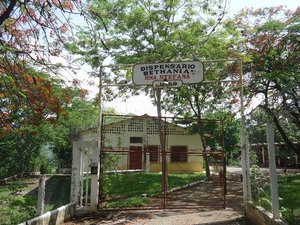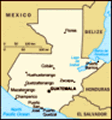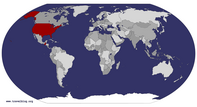Advertisement

 Bethania
Bethania
Founded 1959 by BelgiansThe who, the what and the why of Assajo & Bethania and our help
I've been asked to write about a typical day at work as an AFID accountancy volunteer. As soon as I heard that, I wondered what on earth a typical day was. I can only think of atypical days: they seem more common, and are surely much more interesting.
But I suppose there is a pattern to some of our days, and so I'll write about it soon, but for it to make any sense it will help to talk about why we are here, what's being done by Assajo, and what we are helping with. Get ready to dive in to the backstory. This will be less of an aside and more of a full guided tour.....
We're here to help an NGO that goes by the name of Assajo (Association Santiago Jocotan), as it works to turn itself from the labours of a few Belgian priests and nuns into an organisation that will last beyond their retirement.
Why Belgians, and why here in east Guatemala, I don't know, but there have been Belgians here since at least 1959. If you think

 Presentation
Presentation
Padre Juan Maria is honoured for building a secondary schoolthat's quite a short timescale, Guatemala probably didn't even start being a d
eveloping country until 1970. Modern history is a recent thing here.
I shouldn't speak about Guatemala developing, that's far too broad - you have to separate the rural from the urban and the mixed-race Latinos from the indigenous Mayans. An urban Latino might as well be living in a different country from a rural Mayan, in both practical and stastical terms. We are in an area of rural Mayans. Though by no means universal in the area, poverty and malnutrition are endemic in many of the villages.
Assajo is continuing most of what the P
adres and the
Hermanas (Sisters) set up: The self-funding Bethania Clinic/Hospital, the self-funding local station Radio Chorti used for education and evangelising (though mostly it just plays music) and the donor-funded projects working on health and food security to combat malnutrition and poverty in the villages.
---------------------------
How did we arrive here of all places in rural eastern Guatemala? Well, we were invited courtesy of AFID (Accountants for International Development,
www.afid.org.uk ) and Christian Aid who as one of the project donors wanted to try out the AFID approach. The
idea behind AFID is that often what local developing world NGOs need is better management and information just as much as they need more funding. That isn't to say that people here aren't able, we can both think of some very bright people we've been working with, they just don't have the benefit of the training and experience we've had ourselves, or simply they don't have time to make improvements while still doing their work.
The AFID philosophy is along the following lines: by being accountants, you can help people to do more with less by becoming more efficient in management, or by training people so they can better use the technology they have, or just to be more confident in what they do with IT and Excel (especially Excel). Equally it could involve building mini-systems so that people have information to hand to analyse, providing analyses of how secure the organisations are financially speaking or training people on how to build budgets etc.
Christian Aid haven't tried this approach before, but they are keen to. We, and David who was here before, are Christian Aid's experiment in using volunteer trainers and advisors.
What do we get
out of it?
1 - We are on holiday.
2 - We get to see and live the full Guatemalan experience, maize and all.
3 - The work we do feels so much more useful than being overpaid for idly shuffling reports for organisations to remain nameless.
4. - We are developing useful work skills in training, and in project lifecyles (discuss, analyse, build, discuss, rebuild, discuss, train!).
5 - We learn to properly speak Spanish (with a combination Scottish, sing-songy Guatemalan accent). Well, almost - fluency is relative.
6 - We can genuinely put this holiday on our CVs.
How to build a safer NGO
I've mostly being working on the Radio and Bethania (the clinic/hospital) as they have the most issues. Food security projects like Christian Aid, or the Italian funded Mani Tese have financially speaking the easier problems: they are given money and have to spend it and record it. They have a budget, work out what they can spend it on, and can't spend any more than they are given. Financially speaking, the contrast with the "income-generating" arms couldn't be greater. It's not being cynical
to call the Radio and Bethania "defecit generating". Both are under a constant struggle to make ends meet.
The core issue with the Radio seems to me to be clear. They have been used to being donor funded, and are being weaned off the donors, yet without changing the way they work. With less guaranteed income, they need to be more commercial, and cut the evident fat in their staff roster. There are thousands of radio stations the world over, so the business model works - they shouldn't be losing money. To me, it's just a question of getting the mindsets changed and sharpening the hatchet, but changing minds is difficult, so the progress will be slow, but I hope, steady.....
The core issue with Bethania is how do you fund a hospital to treat diseases of poor people if those diseases frequently are caused by poverty. A kid doesn't get malnourished because his parents don't care, but because they don't have food, or more likely, money for food.
Big donors won't pay because "there are already public hospitals...", so that's no option. The answer is you charge the in-patients a contribution, and don't chase for payment if they are the poorest, and use the outpatients clinic to try and bring in enough income to cover itself, and the hospital's shortfall, and any other running costs. It's always a struggle, and probably every year it makes a loss. Donors come along at irregular intervals for irregular amounts; this helps the deficit but cannot be planned around.
Each year the
Padre gives Bethania a little bit less in donations as he sources less from around Europe. He and his brother in Belgium have been chasing donations for over 30 years. He's 75 and wants to retire, which is fair, but it does mean it gets harder each year to run the hospital.
Now in the UK, loss-making organisations go bust, and so that might be what you expect to happen here. A simple, tough narrative.
In Guatemala it's different. You don't close down, you just stop paying things until a better day. Though usually it's not things you stop paying, usually it's your staff. In this way an organisation can limp along for years without being forced to confront its problems. Here, being in sound financial shape is something which up to a point you can choose to be or not, and that is one of the reasons we are here. Assajo want to be helped to manage themselves better.
-----------------------------------------------------------
Meanwhile, Rhona has been creating an IT guide for the team here, in Spanish and targeted at the sorts of problems you have here including such things as the sheer difficulty of not buying pirate software, the fear and reality of having computer viruses, how to use the internet to train yourself on Excel and Word, and best of all a nifty, ultra-modern back-up method.
One of the things that has been stopping more widespread use of IT here has been the real fear of losing data. On several occasions in the past whole hard disks have been lost. Without back-ups it will happen. If you think to your work, back-up is done behind the scenes, and if you think to your home laptop, chances are you don't back up and you might like me have lost data in the past.
So Rhona chose Sugarsync, a rival to Dropbox, which not only lets you back up files to "the cloud" (check us with the modern technology), but does so in a way which makes it easy to work with files from any computer anywhere, or to share files with others for working. Effectively you can create a network from a number of computers only connected to the web. In short, we're introducing back-up as a side-benefit of things much more useful. That clever dual-use is quite a satisfying part of what we've been doing.
---------------------------------------
...... continued in part 2 with stories of the weird and wonderful days that pass for typical round here....
Advertisement
Tot: 0.307s; Tpl: 0.014s; cc: 8; qc: 50; dbt: 0.103s; 1; m:domysql w:travelblog (10.17.0.13); sld: 2;
; mem: 1.2mb








